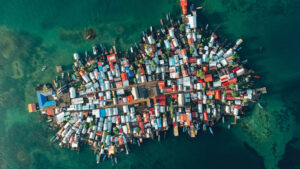Melba Newsome
- 2023

Fellowship Title:
- Climate Displacement for People of Color
Fellowship Year:
- 2023

Discrimination Has Trapped People of Color in Unhealthy Urban ‘Heat Islands’
People of color, more than other groups, live in neighborhoods prone to excess heat and the illnesses that go with it Credit: Chiara Vercesi On a July day in 2021 that would become blazing hot, dozens of community volunteers gathered before sunrise at the Scrap Exchange, a reuse center for art materials in Durham, N.C. Using heat-sensing instruments, they fanned out along prescribed routes through the city, collecting data on air temperature and humidity in the morning, afternoon and evening. The survey was part of a project by the National Oceanic and Atmospheric Administration to identify neighborhoods with really high summer heat levels. The results showed temperatures in historically Black neighborhoods were seven to 10 degrees Fahrenheit higher than in affluent areas where more white people lived. Blocks in these Black neighborhoods had far less shady tree cover than other areas, which were leafy and green. “The 10-degree difference between locations within two miles of each other was surprising,” says Durham County sustainability manager Tobin Freid. She added that the hot areas don’t cool off

How an Indigenous community in Panama is escaping rising seas
The Indigenous Guna people of Gardi Sugdub have plans to move to Panama’s mainland this year Many of the homes on the island of Gardi Sugdub, in Panama’s Guna Yala province, sit right at the edge of the sea. MICHAEL ADAMS In pictures from high above, the island of Gardi Sugdub resembles a container shipyard — small, brightly colored dwellings are jammed together cheek to jowl. At ground level, the island, one of more than 350 in the San Blas archipelago off the northern coast of Panama, is hot, flat and crowded. More than 1,000 people occupy the narrow dwellings that cover virtually every bit of the 150-by-400-meter island, which is slowly being swallowed by rising seas driven by climate change. This year, about 300 families from Gardi Sugdub are expected to begin moving to a new community on the mainland. The resettlement plan was initiated by the residents there more than a decade ago when they could no longer deny that the island couldn’t accommodate the growing population. Rising seas and intense storms are
